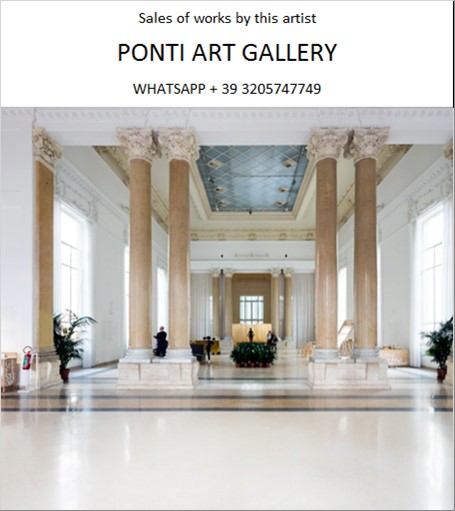Ponti Art Gallery is interested in buying and selling works
of art by this artist.

Jiri Kolar Biography
Jiří Kolář was a Czech poet, writer, painter, and translator whose multifaceted career spanned several decades and whose work left a significant mark on both the literary and visual arts. Born on September 24, 1914, in the small town of Protivín, within the Austro-Hungarian Empire, Kolář grew up in a working-class environment. His father was a baker, and his mother was a seamstress. From an early age, Kolář was exposed to the practicalities of craftsmanship, training as a cabinet maker—a trade that cost him a finger.
Throughout his life, Kolář changed trades several times, working as a construction worker, security guard, and bartender, among other jobs. However, his true calling was in the arts, and by 1943 he had become a full-time writer while living and working in Kladno. He moved to the capital, Prague, in 1945 to work as an editor for the publishing house Družstvo Dílo.
Kolář's early engagement with the Communist Party in 1945 was short-lived; he left the Party the same year due to his critical stance towards the regime. This critical perspective would later lead to his being barred from publishing after the communists took control. In 1949, he married Běla Helclová, but his life took a turn for the worse when, in 1952, police found his manuscript "Prométheova játra" in the property of Václav Černý, leading to his arrest and several months in prison.
Despite these challenges, Kolář was an active participant in the intellectual and artistic life of Prague. He was part of a group of artists and thinkers, including Václav Havel and Jan Vladislav, who frequented Café Slavia. This group was instrumental during the Prague Spring, a period of political liberalization in Czechoslovakia during the late 1960s that was subsequently crushed by the Warsaw Pact invasion.
Kolář's work was again pushed into disrepute after the failure of the Prague Spring in 1968. In 1970, he suffered a cerebral apoplexy that stiffened his right arm. Despite this, he continued to create, and in 1977, he became a signatory of Charter 77, a human rights document. While on a scholarship to West Berlin, the government forced him into exile, and from 1980 onwards, he lived in Paris.
Kolář's artistic output was prolific and innovative. He is best known for his visual art, particularly his collages, which he began exhibiting as early as 1937. His work often combined text and images, reflecting his background in poetry and his interest in the deconstruction of language and imagery. He contributed to the invention of several new collage techniques, such as confrontage, froissage, rollage, and chiasmage, which often involved the meticulous cutting, crumpling, and reassembling of printed materials.
Kolář's collages were not just artistic expressions but also commentaries on modern life and the political turmoil he faced. His work often juxtaposed fragments of text and images to create new meanings and to challenge viewers' perceptions. He saw collage as a natural continuation of his written poetry, with many of his pieces fitting into several of his own technique categories or defying categorization altogether in favor of visual impact.
Despite the political challenges and health issues he faced, Kolář's work continued to be exhibited internationally, including at the Guggenheim Museum in New York and in Prague. He also published a "Dictionary of Methods" in Paris in 1986, which articulated the various techniques he invented and underscored his affinity for conceptual classification and systematization.
Kolář's later years were marked by physical challenges, including an injury to his spine in 1999, which led to him spending his last years in a Prague hospital. He passed away on August 11, 2002, in Prague, leaving behind a legacy that continues to influence artists and writers around the world. His work remains a testament to his relentless creativity and his commitment to exploring the boundaries of art and language.
Jiri Kolar Quotes and Sales of
Works
Ponti Art Gallery selects and deals with paintings by the
artist. Upon request, we provide free estimates and
evaluations, communicate prices, quotations, and current
market values.
If you are interested in BUYING or SELLING works by the
artist, contact us immediately.
If you wish to sell or receive an evaluation of the
works:
Send us a frontal photo of the painting, one of the back,
and one of the signature. Also, indicate the dimensions of
the work. Inform us about the purchase origin of the work
and any kind of available documentation (purchase
receipts, certificates of authenticity, publications). One
of our operators will respond to you on the same day. We
guarantee maximum confidentiality and extreme
professionalism.
If you wish to purchase works by the painter: Contact us
and let us know your request. We will inform you about the
available works. We also offer the possibility to
subscribe to our NEWSLETTER, through which you will be
informed at the beginning of each month about the latest
acquisitions of the art gallery.
You can send us pictures of the work:
